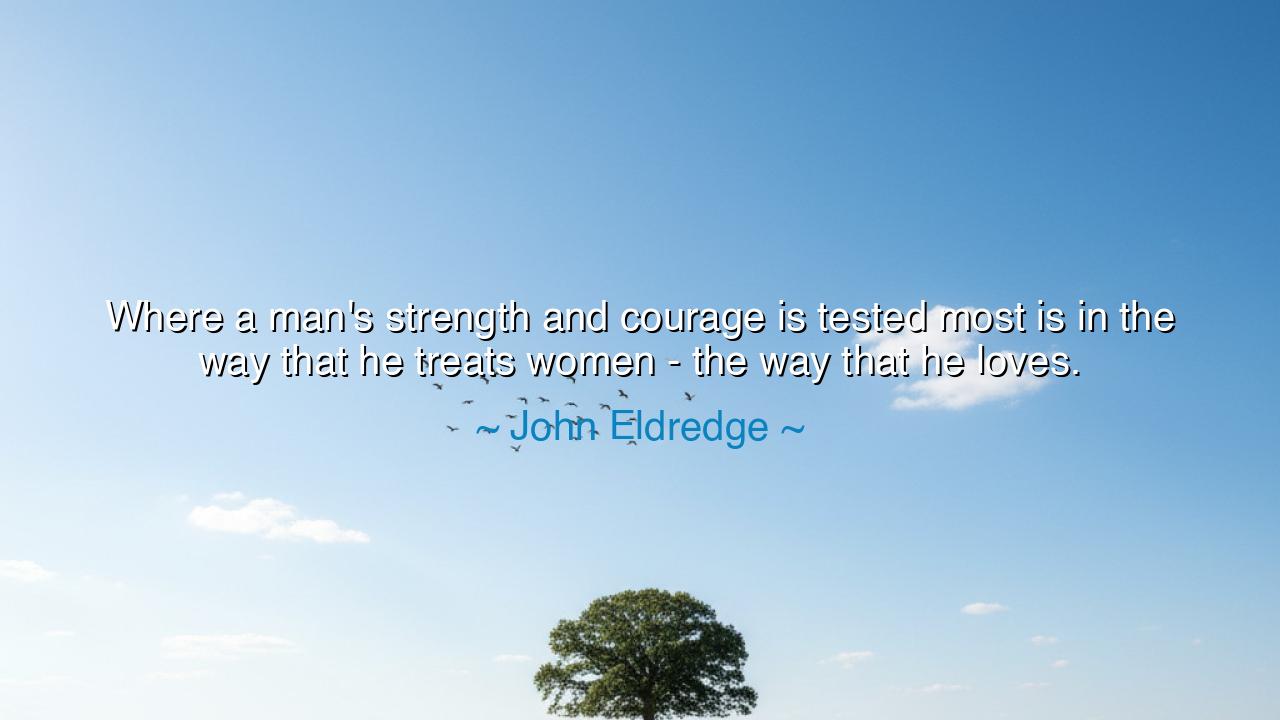
Where a man's strength and courage is tested most is in the way
Where a man's strength and courage is tested most is in the way that he treats women - the way that he loves.






When John Eldredge declared, “Where a man's strength and courage is tested most is in the way that he treats women — the way that he loves,” he was not speaking of chivalry in its shallow form, nor of romance as the world portrays it. He spoke of something far deeper — the sacred trial of the masculine heart, the testing ground of its strength, courage, and tenderness. In every age, men have proven their valor in war, in conquest, in the pursuit of ambition. But Eldredge reminds us that the truest test of a man is not how he fights the world, but how he guards, honors, and loves the ones entrusted to his care. For to love rightly — with patience, humility, and reverence — is the greatest act of courage a man can ever perform.
The ancients knew this truth, though they spoke it in the language of myth. The hero’s journey was never truly about the dragon or the treasure — it was about learning to love rightly. The warrior who cannot be gentle is not complete; the king who cannot cherish is not just. Strength without tenderness becomes tyranny, and courage without compassion becomes cruelty. The man who would be whole must learn to use his power not to dominate, but to protect; not to control, but to uplift. In the eyes of Eldredge, the measure of a man’s greatness lies not in the battles he wins, but in the heart he keeps pure while loving another soul.
Consider the story of Sir Thomas More, the English statesman who stood against the tide of his own king for the sake of conscience. When faced with the demand to betray his faith, he did not raise a sword, nor shout defiance. He stood calm, steady, unmoved — guided by love for truth and love for his family. Even as he faced execution, his last words to his daughter Margaret were not of fear, but of tenderness and courage. His strength was not in defiance, but in fidelity — to his beliefs, to his integrity, to those he loved. Through him we see what Eldredge means: the courage of love is the highest kind of bravery, for it demands the heart remain open even when the world turns cruel.
To treat women rightly, as Eldredge suggests, is to understand that love is not possession, but partnership; not conquest, but communion. A man’s courage is revealed not in the power he holds, but in the restraint he chooses. When he listens instead of commands, when he comforts instead of conquers, when he defends dignity instead of demanding obedience — there, his true strength shines. For it is easy to fight for glory; it is far harder to love with grace. The battlefield of the heart is more perilous than any field of war, and only the bravest endure it without surrendering to pride or fear.
And yet, this teaching is not meant to weaken men, but to ennoble them. To love well is to become fully alive, fully human. It demands a courage that is steady and enduring — the courage to be vulnerable, to forgive, to remain gentle in the face of anger, to keep one’s word even when it hurts. In this way, love becomes not a weakness, but the ultimate proof of manhood. It requires mastery not over others, but over oneself. The warrior who conquers nations may be admired, but the man who conquers his own temper and loves faithfully is revered by heaven itself.
Eldredge’s insight comes from a lifetime of observing that modern man has forgotten this truth. He is taught to prove himself through competition, success, or dominance — but not through devotion. And so the world is filled with strong men who are inwardly hollow, courageous men who do not know how to love. Eldredge calls them back to the ancient path — to remember that the strength of a man was never meant to wound, but to heal. Love is the final test of character, for it reveals who we are when pride, armor, and ambition are stripped away.
So, my listener, take these words as a torch in your own life. Let your strength serve love, not overshadow it. Be brave enough to protect, humble enough to listen, and strong enough to forgive. Love with integrity, even when it costs your comfort or your pride. For in the end, it is not titles, victories, or possessions that define you — it is the way you love. To love rightly is to reflect the divine; to love courageously is to fulfill your destiny as a man. Remember this: the greatest strength is not in the hand that conquers, but in the heart that cherishes.






AAdministratorAdministrator
Welcome, honored guests. Please leave a comment, we will respond soon